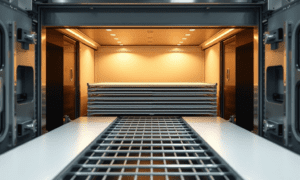
By Rhonda Dibachi, CEO and Co-Founder, HeyScottie
I am a strong believer in Gartner’s hyper-automation predictions: “Everything that can be automated will be automated.”
So, it’s funny now that ChatGPT appears to be coming for white collar jobs, everyone is in a tizzy.
Automation has been the standard in manufacturing production lines for decades, increasing safety, improving quality, speeding production, and decreasing waste.
Artificial intelligence (AI) and machine learning seem like the logical next step.
And, they are.
It may just be a little harder to get there in manufacturing.
It’s Complicated
It’s not because manufacturers don’t want to. They’re as willing as anyone to take risks.
The main impediment to change in manufacturing comes overwhelmingly from the regulatory-heavy nature of the sector, which affects almost every physical product sold in the US and places an extra burden on manufacturers.
For example, in my previous company, we made industrial LED lighting. Every light we produced had to have an ETL label, proving, amongst other things, that our products would not cause electrical shorts, or damage a customer’s electrical system. Each new product had to be “listed.” We were periodically subject to surprise audits to ensure compliance. It was a big deal; it required a ton of paperwork and it added significant cost to design and operations.
If we made any significant change to a product or a process, we usually had to re-list. This meant redocumenting, resubmitting, and having to meet additional auditing requirements. Because of this, we had to calculate the feasibility and justify the additional cost of compliance for every significant change we contemplated.
That is a huge impediment to innovation in this sector. And—along with the physical nature of manufacturing—it’s why manufacturing as a sector has been a digital laggard.
The State of AI in Manufacturing
So many manufacturing functions are already automated, it seems like it should be a snap to apply an AI or machine learning tool to them. But these tools need a lot of input from which to learn if they’re going to perform optimally.
For example, a major car manufacturer training AI to perform quality inspections found that it took more than 140,000 samples to identify 17 types of defects. All of this, of course, backed by an elaborate and expensive infrastructure of cameras, computer vision, programmable logic controllers, MES, databases and layers of additional software integrated into the backend.
All of this means that the only manufacturers actually delving into AI on the production line right now are the big guys.
And that means that whatever systems they’re building to support AI are proprietary.
So, it should be no surprise that all the big tech companies are working to get us all on the same AI page—Microsoft, Google, Meta, Nvidia, and IBM, to name a few.
How Can Small to Mid-Size Manufacturers Catch Up?
While the mega corporations are working out the kinks in applying AI and machine learning, there are other ways smaller manufacturers can start using AI now to help position themselves to remain competitive.
Not on the shop floor. Not yet.
But, as I mentioned ChatGPT before, there are similar cloud-based and SaaS offerings that can be accessed right now. In the writing category, Writesonic, Bard, and DhiWise—are a good place to start experimenting with and learning how to use AI.
Others that I have tried and liked are Agent GPT, WriteSonic, Gamma AI, and there are more popping up every day.
Even with a relatively short list of tools, you can become more productive on the types of things most of us hate doing: generating emails or chat responses for your website, writing marketing text and catalog descriptions, and organizing sales plans.
Smaller manufacturers can and should start exploring AI now for these types of tasks as a first step toward building the data flows that more sophisticated AI will need.
About the Author
Rhonda Dibachi is the co-founder and chief executive officer of HeyScottie, an artificial intelligence-powered platform delivering superior sourcing options for manufacturing finishing services, She is also American business executive, entrepreneur with several success startups and an enterprise which went public, and author. She started her career as a nuclear engineer and is now a champion for AI and sustainability in the manufacturing sector. Rhonda has served as a Board Trustee and Advisor for a number of educational, non-profit, government and educational organizations.


































